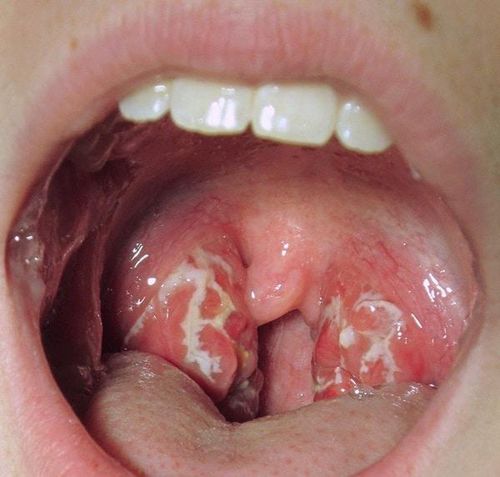This is an automatically translated article.
Some signs and symptoms of nasopharyngeal cancer are quite similar to common tonsillitis and nasopharyngeal disease. Sometimes it makes people subjective and leads to confusion.
1. What is the difference between tonsillitis and nasopharyngeal cancer?
Differentiate through specific symptoms:
1.1 Symptoms of tonsillitis Pus appear between the tonsils and around the tonsils (For tonsils with pus) Throat (feeling that something is stuck in the throat), pain throbbing pain in the throat Pain spreading to the ear, swallowing pain, or not being able to swallow More saliva than usual, pain when opening the mouth wide Fever Jaw swelling.

Giai đoạn đầu của bệnh, vòm họng bị đau âm ỉ không theo cơn, sau đau dữ dội và sẽ lan ra hai bên
1.2 Symptoms of oropharyngeal cancer At any stage of the disease, the impact of oropharyngeal cancer is greater than that of common tonsillitis and is much more dangerous when the cancer spreads to the muscles. Specific organs such as brain, bones, lungs... Common symptoms are:
Headache: The first stage is a dull pain that does not follow the pain, then the pain is intense and will spread to both sides. Tinnitus: The first stage is mild tinnitus on only one side, then both sides will tingle, and hearing will be much worse. Nasal congestion: In the advanced stage of nasopharyngeal cancer, patients may have persistent stuffy nose, even nosebleeds, or bloody discharge. Swollen lymph nodes at the angle of the jaw: The lymph nodes are small at first, the snake has the ability to move, then it will harden and stick in the neck area, it will feel painful and then gradually spread to many other locations. Cranial nerve palsy: Symptoms occur when cancer has spread to the base of the skull, causing poor organ coordination.
Trắc nghiệm: Làm thế nào để bảo vệ lá gan khỏe mạnh?
Làm test trắc nghiệm kiểm tra hiểu biết về gan có thể giúp bạn nhận thức rõ vai trò quan trọng của gan, từ đó có các biện pháp bảo vệ gan để phòng ngừa bệnh tật.2. How are pharyngitis and nasopharyngeal cancer different?
Pharyngitis and nasopharyngeal cancer are different in the following specific characteristics:
2.1 In essence, pharyngitis is a common benign disease, causing only discomfort and leaving no serious consequences. Meanwhile, nasopharyngeal cancer is a malignant disease with a rapid progression rate. More dangerous, nasopharyngeal cancer can cause death for patients if it is malignant.
2.2 About subjects suffering from pharyngitis: At any age, it usually occurs in young children. Nasopharyngeal cancer: Between the ages of 30 and 50, there is a high risk of developing the disease. The incidence of oropharyngeal cancer is much higher in men than in women. 2.3 Signs and symptoms of pharyngitis have the following typical symptoms:
Sore throat, pain when swallowing saliva, food. Dry throat, itching is very uncomfortable in the throat. Feeling stuck in the throat want to spit to expel the foreign object. No fever. The throat is red and swollen, with the appearance of white or red particles of different sizes. Nasopharyngeal cancer has the following recognizable signs:
Difficulty swallowing, sore throat for a few days. Swollen lymph nodes in the neck. Voice changed, hoarse. Prolonged dry cough. Nosebleeds or pus in the nose. Throat feels choking, choking. Unexplained weight loss. Wheeze. Pain in the ear.

Khó nuốt có thể là biểu hiện của bệnh ung thư vòm họng
2.4 Treatment time for pharyngitis granulomatosis is treated very quickly, and in a short period of time the symptoms of the disease will disappear, without too much impact on the patient's health. Nasopharyngeal cancer needs treatment in both long time and good for a lot of money. If the disease is not detected in time, the ability to cure the disease is not possible. Most cases of nasopharyngeal cancer are found in the advanced stage, therefore, the treatment of the disease is extremely difficult and only treatment is available. The effect is to prolong the life of the patient. To detect and diagnose nasopharyngeal cancer in time, in order to have appropriate treatment measures. The following subjects at risk of oropharyngeal cancer should be screened for early cancer so that the disease can be detected in time::
Customers who have a family history of oropharyngeal cancer, Customers who smoke, drink much alcohol. Customers with frequent abnormal symptoms: nosebleeds, headaches, ringing in the ears, stuffy nose, lymphadenopathy in the neck... Customers wishing to have regular check-ups to screen for nasopharyngeal cancer throat.
Please dial HOTLINE for more information or register for an appointment HERE. Download MyVinmec app to make appointments faster and to manage your bookings easily.













